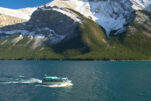CANstruction event puts building skills to the test
By Alejandra Pulido-Guzman - Lethbridge Herald on March 8, 2024.
LETHBRIDGE HERALDapulido@lethbridgeherald.com Members of the architectural and engineering industry, along with aspiring students, put their building skills to use as part of the annual CANstruction YQL Thursday at Centre Village Mall.The Annual CANstruction event gives a boost to local food banks by donating all the cans used in the construction of several structures after being on display at the mall.
Chair of CANstruction Lethbridge board, James Walshe said this year organizers have seven teams, which is one more than last year, even though technically two are considered new.
“We’re always trying to get more teams and we’re slowly building up. This year we have Winston Churchill High School as a team, which has been nice because we haven’t had an actual high school team for quite a few years,” said Walshe.
 He said another team that is considered new once again, as they have not been able to participate in a few years, is the University of Lethbridge.
 “I think they might have been on years ago, but not since I’ve been on it, so they are considered a new team as well,” said Walshe.
The other teams are from Save on Foods, Associated Engineering, MPE Lethbridge, Lethbridge College, and the long-standing partnership between Bergen & Associates and the Centre Village Mall.
Walshe said the cans used to create the structures from the Lethbridge College and the University of Lethbridge teams will be donated to their respective food banks, while cans from the other teams will be distributed between the Lethbridge Food Bank and the Interfaith Food Bank.
The structures will be on display at Centre Village Mall until April 11, and during this time community members are encourage to vote for their favourite, which will decide who will receive this year’s People’s Choice award.
Voting will take place at Save On Foods where volunteers from the Lethbridge Food Bank and the Interfaith Food Bank will collect the ballots.
“They have little cards that they give out and people can go and vote for their favourite structure and in order to vote you have to either donate a can or cash, whatever works best for you,” said Walshe.
He said last year some participants had friends and family bring multiple cans to be able to receive multiple votes, which at the end made a bigger impact on the food banks, which is the main goal of the competition.
“I don’t really know how people voted in the past, but they used to receive about 40 votes in total, while last year when we introduced the table and vote by donation, we received over 400 votes,” said Walshe.
 He said those donations translated into quite a bit of cash and cans for the food banks, and they are expecting even more votes this year as they have implemented a volunteer schedule to always have someone at the table.
Associated Engineering, which has taken part in CANstructure Lethbridge for many years, and sponsors the fee associated with the competition registration through CANstrucure, decided to create a locomotive for this year’s competition and infrastructure manager with AE Ben Leusink said it was going to take approximately six to eight hours to build.
“I think we have about 2,250 cans in our structure and I think it’s about $6,000 worth of food. We raised more but the additional money just gets donated straight to the food banks,” said Leusink.
When describing the design process, Leusink said every year they sit down as a group and decide what to build. In the past they have built a hot air balloon and a bridge, but neither has been decided on for a specific reason.
He explained the process involves using AutoCAD to design the structure before going to the grocery story and deciding which cans to use.
“By the time it’s done we measure cans at the grocery store, we take the size of the cans, input them into AutoCAD and we draw the can up to use that dimension to build the structure in three dimensions,” said Leusink.
 He said once the model is done on 3D, they print off the sheets and come up with a game plan on building it.
“Then we use those plans and we build the structure. We usually go by the size of the cans or the colour, so we’re either going to go by this size to make sure everything lines up or we’ll go by specific colours of the cans so that way whatever structure we’re building is the right colour,” said Leusink.
 He said in order to accomplish this, they rotate the labels to create the proper colour flow. 3
-2




